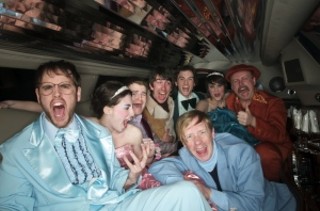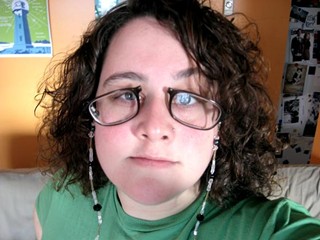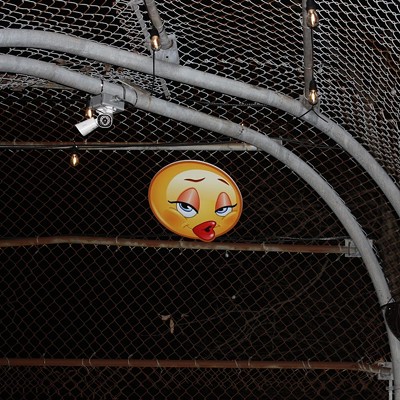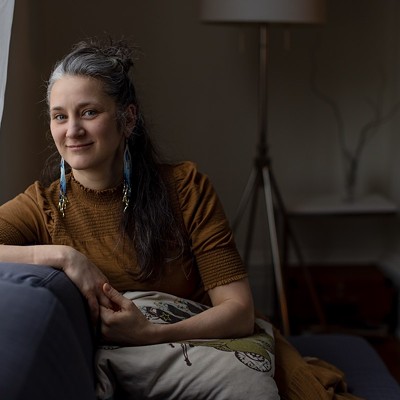Picnicface has this thing about “the right laugh.”
The eight-member Halifax comedy troupe knows from laughs—-Picnicface has been turning away patrons from its Sunday Night Comedy Spectacular for the past year. That line stretching past the vacant Sam’s building every other Sunday? It’s theirs. Those people scurrying around a packed Ginger’s Tavern as the clock creeps past eight o’clock, plastic chairs held high above their heads, trying to accommodate everyone? That’s them. They charge just five dollars, the average Starbucks expenditure, for a 45-minute sketch show—-almost always brand new—-every other week.
And Halifax eats that shit up. They don’t chuckle or chortle or titter. They exclaim and roar and cheer, as if a Picnicface show were a sporting event rather than comedy. And Picnicface is happy with the reactions they earn, most of the time.
“The audience is so supportive in this city, so they’re very forgiving which is fantastic, but you have to have your own gauge as well,” says Andrew Bush. “If something destroys onstage you have to, as a comedian, understand: Is this intrinsically funny to me? What kind of laugh is that? Is that a laugh because
This analysis is deployed constantly. Gathered on a couch cluster in the lobby of the Dalhousie Student Union Building, eating Tim Hortons’ approximation of cinnamon buns, the troupe—-Bush, Mark Little, Evany Rosen, Cher Hann, Brian MacQuarrie, Bill Wood, Kyle Dooley and their intern, Steve Cutler—-throw out ideas for a best-of show on April 6. Little sits with a laptop, weighing each suggestion. Some get an easy “sure” and are added to a growing Word document. Others are rejected for needing rehearsal time that does not exist—-they’re shooting a new video on Sunday, and call-time is 7am.
“‘Cockblocker’ got a huge audience reaction,” says Bush.
“So did ‘George Bush and Stephen Harper in a Bathtub,’” says Little in a tone that indicates “Cockblocker” will not be on the set list.
We’ll come back to the bathtub. That was the wrong laugh.
—————————————————-
Little, 25, and Dooley, 22, met at an improv camp in Regina in 2004 when the latter was in high school—-“Mark just, like, wore a bandanna and the chicks loved him,” says Dooley. “I was much too young to be a counselor,” says Little—-and reconnected at Dalhousie. Each had trained in improv in his respective town, Little in New Westminster, BC, and Dooley in Oakville, ON, and they’d both competed in the Canadian Improv Games.
They started performing together almost immediately in 2005, putting in a school-year’s worth of improv performances at King’s. Rosen, who trained at Second City as a Toronto teen, jumped on board and they became Pumpkinface. (The eventual morph into Picnicface came, says Little, from needing “a name to put on our King’s posters, so we just bounced stuff around for a while, cramming words together that don’t belong together. Laughterknife was in the running.”)
By summer 2006, they found themselves without a stage. (Cue the wacky venue hijinks montage.) They started with the Speakeasy—-“No one knew where the fuck it is!” says Dooley. “Obviously it’s a punk bar above a steakhouse,” says Little—-and moved on to the One World Cafe and The Frigate. They landed at Ginger’s when The Comedy Dawgs, one of the only comedy presences in town at the time, moved to the Seahorse. By that time, they’d picked up Hann, 21, who’d been performing stand-up since she was a teen; MacQuarrie, 25, an acting major at Dalhousie; and Wood, 27, who’d been in local troupes The Improv Knights and Hen Men. Bush, the Lower Sackville native you might remember from Street Cents, returned from Toronto with a DV camera, introducing video into the show. Scott Vrooman, 29, was a government employee with a penchant for joke-telling. (“All I know is two months later I was fully immersed,” he says of the time between his first meeting with and induction into the troupe.)
“We just decided to make the transition into sketch when we moved to Ginger’s. We knew it wouldn’t be as good as improv, but we’d do as much sketch as we could, then we’d have a small break and do improv, just in case the sketch didn’t work out,” says Little. “Maybe about six shows in, a bunch of people from the English department came, and someone told me that he actually preferred the sketch to the improv. That’s about the time that the tables started to turn, and improv became less the final attraction and more just the icing on the cake. But there was a new cake. There was a new cake in town. Print that metaphor!”
The group had a bit of a rotating cast until it settled into its current roster, a symptom of not having yet gelled as a unit. “Back when we used to do a show every week, people would just show up at Ginger’s and be like, ‘I wanna do stuff.’ And we were like, ‘OK, we meet here at this time. Bring a sketch. Whatever you want,’” says Wood. “So there was a bunch of people who cycled through. And the people who are here now were able to deal with the workload, and the tone of ‘if it’s not funny, you get told it’s not funny.’”
The inconsistent roster mirrored the inconsistent audience.
“We used to poster like crazy,” says Dooley. “That first September, from an entire summer of 60 people maximum, we had a best-of show. We opened with the ‘Monster Rap,’ and we sold out that one. But then...” He imitates a cartoonish downward spiral.
“We had a packed house the night we played ‘Powerthirst’ the first time,” says Little. “Powerthirst” is the ad for a fictitious energy drink that currently sits at almost 5.9 million YouTube views. “I think it took several months after that for local people to even realize we were on the internet. It was two completely different audiences...The consistent amazing shows started last September, and with the exception of Easter, we’ve sold out every show.”
“As of September we started taking it seriously,” says Dooley. “Write Friday, rehearse Saturday, show up at noon or one on Sunday, rehearse everything again, tighten things, cut things, put it up.”
“Suprisingly, at this point in September, even though that’s when we formally started taking it seriously, that’s about the time when I calmed down,” says Little. “Last year, when we weren’t taking it seriously, I was a big stressball. I was having, like, an aneurysm per show.”
“It’s a lot calmer now,” says Dooley. “We’ve got a lot more trust in one another now.”
“Every time I go into a show and it’s packed I’m like, ‘What the hell. How did this happen?’” says Hann. “It amazes me every time. I don’t think any of us expected us to explode the way it did—-it’s just Halifax didn’t have sketch comedy. At all. So as soon as they found it, people were willing to latch on and ride it out.”
Last summer, Picnicface uploaded all their videos to funnyordie.com, the comedy video portal co-owned by Will Ferrell (an instant hit thanks to The Landlord, featuring Ferrell getting chewed out by a raging two-year-old).
“We were posting our stuff on YouTube for about eight months to no response whatsoever. We were sort of in the same mess that Andy had been in with his videos for the previous two years—-maybe you get a thousand people to see it over a couple months,” says Little. “Then one day we decided to upload everything we’d ever posted to YouTube on Funny or Die, and almost every video took off.”
Ferrell selected “Powerthirst,” a clip-art-and-voiceover compilation that includes no actual video; “Near Death Experience,” about people who would head toward the light only to find a horse raping them, and “The Proposal,” a bait-and-switch starring real-life couple Bush and Rosen, as his personal favourites. Since then, Picnicface’s online profile has stayed high on Funny or Die, YouTube and College Humor, thanks to videos that marry absurdity (“Super Bingo” features celebrity bingo caller Bruce Springsteen and old guys getting impaled by pegasi), piss-taking (in “Women in Comedy” Rosen’s earnest speech about being a girl in the troupe is constantly interrupted by dudes doing dude shit), a way with words most ad execs would kill for (“Shockolate: It’s like adding chocolate to an electrical storm” is one of the sells from “Powerthirst”) and just plain old button-pushing, like “Diaries of Dopey” (Hann as Snow White’s smoking, child-molesting buddy) and “The Real Zone,” which positions Bush as a hater of Asians.
“It legitimized us in a weird way,” says Little. “When ‘Powerthirst’ took off, people started seeing other things.”
“And instead of being a ‘Powerthirst’ fan, they’re a Picnicface fan,” says Dooley.
With that unprecedented exposure—- “Powerthirst” was a nominee for the 2007 YouTube Awards, but lost to singing Harry Potter finger puppets—-and the local live show under control, Picnicface now have their sights set on a television show. They’ve shot an 11-minute pilot—-a demo reel—-to show producers. They’ve landed an agent at one of the big five LA talent agencies, UTA, to help make the push—-a rare thing for a Halifax performer not named Ellen Page.
“Everyone has come to us so far—-all producers, all agents, all managers,” says Little. “We haven’t managed to land a show or even an option really, nothing in the States, despite the fact that these places are coming to us—-so if we had to sell ourselves, we suck at selling ourselves!”
“We think big. It’d be awesome to replace MadTV,” says Bush, who directs and edits the videos. “I think Canadian comedy is misrepresented in this country. There is a place for Air Farce, there’s a place for 22 Minutes, there’s a place for Wayne and Shuster—-but for me it just seems so lopsided. There hasn’t been a different type of sketch show since Kids in the Hall.”
“We stay away from politics. My personal reason is not because I hate political comedy—-The Daily Show is probably my favourite comedy show, and The Colbert Report is up there—-I just hate it when it’s not done well,” says Little. “And every Canadian show, that seems to be the way things go. I read this interesting thing recently where they called it ‘pseudo-satire.’ And I have the feeling that if I attempted satire, if we did, it’s about all we’d get at, these jokes that pretend to say something about political realities but ultimately fail because we just can’t dothat shit.”
Their own comedy leanings are a mixed bag of classic and modern: Monty Python; Zach Galifianakis; Tim and Eric Awesome Show, Great Job!; Jon Stewart. Hann began performing by re-enacting her favourite early 2000s Saturday Night Live sketches, but she reaches back before she was born—-“Gilda Radner’s pretty much the shit.” Dooley, too, goes for the early Studio 8H years, listing Dan Aykroyd, Bill Murray and Eddie Murphy as faves. MacQuarrie remembers crying the night John Candy died—-“He set the bar for me because he was so witty and such a good actor”—-the same night he first saw a Wayne’s World sketch. Rosen grew up on Woody Allen and the Marx Brothers, while Vrooman took in Seinfeld and The Simpsons. “My mom’s British,” says Wood. “And so being funny is culturally important.”
With the ascension to Hot Commodity comes the age-old worry of success blowing everything apart. Picnicface know that the moment an outside force becomes involved—-producer, network, censors—-the dynamic of the group shifts.
“It’s come up with certain opportunities we could’ve taken and chose not to because we were worried about the integrity of whatever makes Picnicface ‘Picnicface’ and retaining the intellectual rights to that,” says Rosen, who at 20 is the troupe’s youngest member. “And there are certain situations where a producer can come in and buy the rights to the show, essentially, and then hire you on as writers and actors. So in theory, if that happened, they could fire everyone, cast eight new people and that would be Picnicface and we would be eight individuals who had no ties to it.”
“The sticking point we’re at right now is that we’ve proven to everyone that we can do sketches well, we don’t have anything else to prove that way,” says Vrooman. “There’s a lot of sketch troupes at that stage, but it’s a matter of can you go the extra level and come up with a show and execute that in a way that’s gonna say, ‘OK, now we’re gonna need money to make a show.’”
“One of the things I fear is that once we’re picked up by an American station, you know, unless it’s HBO or Comedy Central, our style is going to have to change,” says MacQuarrie. “And you’re no longer getting Picnicface, you’re getting a producer’s idea. People look at us and they’re like, ‘They’re cool and they’re hip, let me get them,’ cause people will watch us. And then they’ll dump us, because that’s what the US does.”
“We like to think that we’re omnipotent,” says Wood. “We are the bosses andwe love that. But once we’re not the big fish, once we have to start looking for someone else to give us money, we start to get nervous.”
“I don’t want to stick my head in the clouds, I want to be realistic,” says Hann. “Not many people become huge and explode —-the chances of it happening for us are decent, and that’s amazing, but I don’t want to think about what could happen because if it doesn’t, I’ll crush my own soul and I don’t want to do that.”
———————————————————-Back to that bathtub. Little lays it out:
“Andy and I were onstage and challenged each other to a sketch-off. We would form teams of four and just do really bad sketches, one after another, really fast. One of them, which was stolen from Second City—-it just epitomizes what we hate—-it was ‘George Bush and Stephen Harper, what are you doing in the bathtub together?’ ‘Solving the softwood lumber debate.’ And it got...two...huge...laughs!” He shakes his head. “We felt betrayed, man. But that proved to me why a place like Second City does what it does, because you do what works to get the laughs and why it’s so important to me to get the right laugh. You get laughs doing things you don’t think are funny and you thinkto yourself, ‘Oh maybe I just didn’t realize that’s funny,’ but I think you always have to have that disconnect of ‘Do I really think that’s funny or is it just lowest fucking common denominator’—-he finds the thread—-‘pseudo-satire.’
“It was almost like we needed the audience to take a moment and say, ‘That was so dumb’ and then after that moment, laugh at the fact we just did something so dumb,” Little says, winding down. “But because the laugh came so immediately and so uproariously, it was like, ‘You have betrayed us,’ but also we’ve betrayed you because we’ve led you to believe that we really think this is funny.”
With or without a television show, Picnicface will always strive for the right laugh—-not elusive, exactly, but never a sure thing.
“I remember Conan O’Brien saying one time, even a guy of his stature, that this keeps happening to him—-he’ll go out one night, have a great show and be like ‘Oh yeah, I’ve got this, I’ve got this down’ and the next night it’ll be crappy,” says Vrooman. “Comedy is a volatile element. It’s great that way because I can’t think of anything more challenging—-you never master it. Ever.”
















